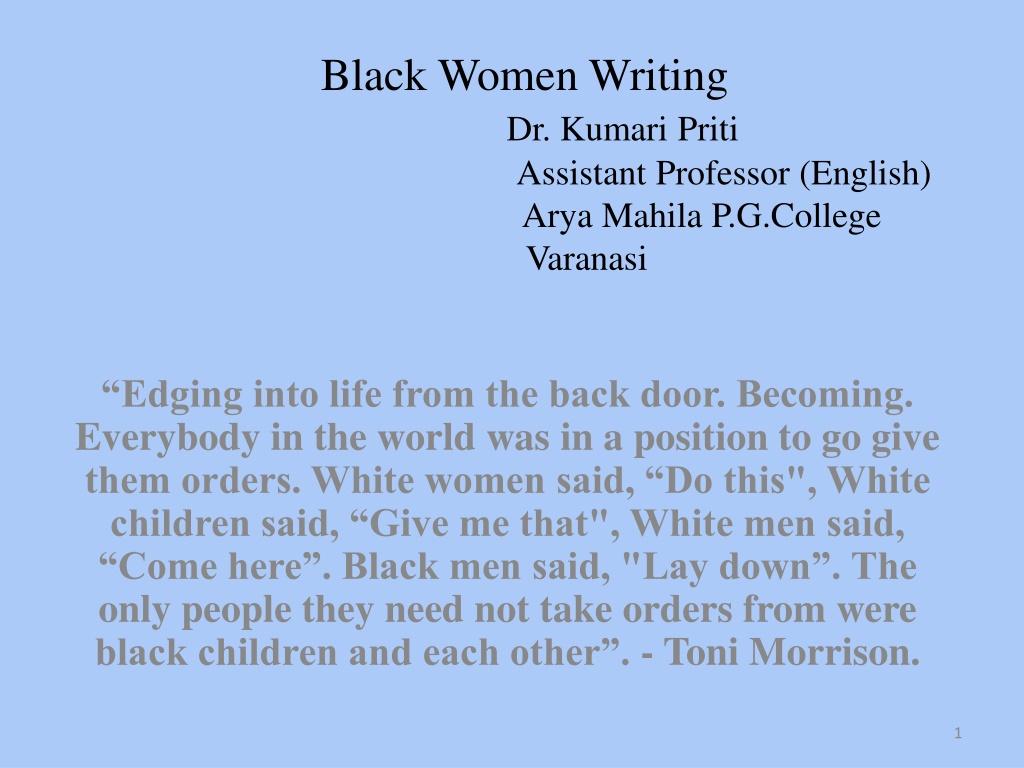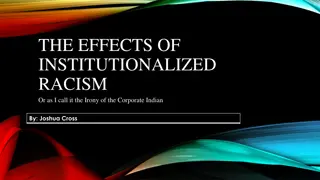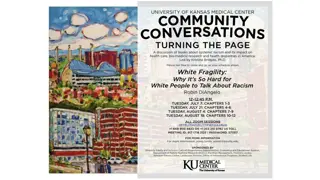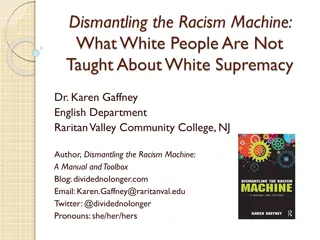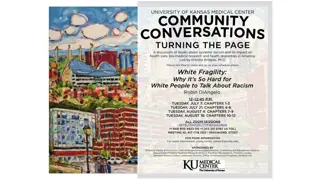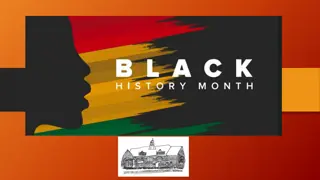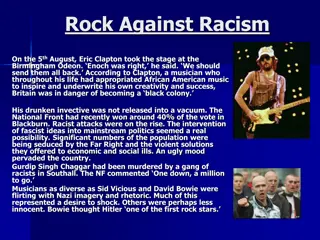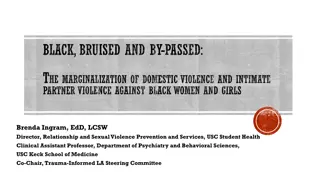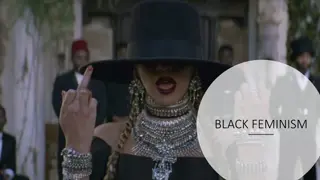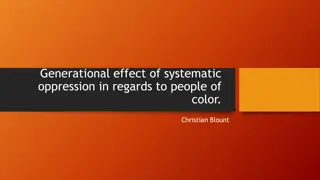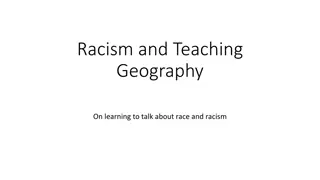Struggles of Black Women Against Racism and Oppression in America
The institutionalization of black slavery in America created a deep divide between whites and blacks. Racism ingrained in American history perpetuated the belief of black inferiority. Despite racial discrimination, black communities formed a strong identity post-abolition. Black women faced intense persecution and oppression, bearing the burden of their men's suffering. The intersection of racial and gender discrimination intensified the struggles faced by black women in a patriarchal society, shaped by the legacy of slavery.
Download Presentation

Please find below an Image/Link to download the presentation.
The content on the website is provided AS IS for your information and personal use only. It may not be sold, licensed, or shared on other websites without obtaining consent from the author. Download presentation by click this link. If you encounter any issues during the download, it is possible that the publisher has removed the file from their server.
E N D
Presentation Transcript
Black Women Writing Dr. Kumari Priti Assistant Professor (English) Arya Mahila P.G.College Varanasi Edging into life from the back door. Becoming. Everybody in the world was in a position to go give them orders. White women said, Do this", White children said, Give me that", White men said, Come here . Black men said, "Lay down . The only people they need not take orders from were black children and each other . - Toni Morrison. 1
The institutalisation of Black Slavery in American drew a wide gap between the whites and the blacks which could never be bridged. Racism was deeply rooted in the historical tradition of America and a strong feeling got entrenched in the psyche of Americans that blacks were not merely different from whites but inferior to them. Slavery in its most basic and rampant form puts some human beings whimsically into the power of others, legalizing inequality and inferiority. The race consciousness of blacks was exacerbated by the legalized difference between them and the dominant white community so that colour became the code word. The black stereotype is entrenched in a colour which is permanent, inextricable, stigmatized and a matter of shame. 2
But the term race consciousness has a deeper sense. It refers not simply to an individual s awareness of a cult, but a binding concern on the part of the blacks. It has been a defining concept for the blacks in forming their own community of Afro-Americans after the abolition of slavery in 1865. Due to racial discrimination and the consequent debasement of black men their women were subjected to various persecutions. According to Zora Neale Hurston, the white man ruled the black world and this fact was understood and accepted by the blacks without any visible murmur of protest. However indignation and resentment at the inhumanity and base treatment they were subjected to seethed deep within the unconscious of blacks. 3
Hurston decried the abject surrender of blacks to their enforced fate of discrimination and subjugation by the whites for many centuries. He was the victim of prejudice, discrimination, injustice, persecution and outright murder. In spite of his awareness of his subjugation the black man did not wish to bear the brunt of it alone. As a subject of white authority and oppression he passed the burden of his misery to his black woman. This burden invariably becomes transmuted into violence and oppression of the black woman by the black man: He hand it to his woman folks. 4
The oppression experienced by black women was more in degree when compared to that suffered by their men. Racially and sexually black women were relentlessly subjected to persecution both within their own community and by the dominating white race. The white patriarchal society and the economic of slavery sharply conditioned the life of the black community. The white master owned his slaves and their family. The fact that his consent was necessary for their marriage is crucial for understanding the white patriarchal cultural attitude towards black women which had very powerful and far-reaching psychological consequences. 5
Usha Puri comments: In a world where men and women were mere property and women victims of owner s lust, separation, disruption of family and an eradication of affection were normal In black families familial or conjugal love was in a perpetual state of unfulfillment. Freedom was not an imaginable dream and life choices were severely limited. Margaret Walker compares the Blacks to hunted animals. And being black and free! Why my God, that is just like being a hunted animal running all the time . 6
The hopes and dreams of black women for love and the freedom to marry shriveled and died within them. Both their past and present ravaged the self and they were conventionally deprived of self-respect and dignity. Simone de Beauvoir rightly states: Humanity is male and man defines woman not in herself but as relative to him, she is not regarded as an autonomous being.... He is the subject, he is the absolute she is the other (The Second Sex 16). The lack of self-esteem and status of black women as human beings and females rendered them perpetually defenseless against both the black men and the white men. 7
The vulnerability of black women makes them susceptible to very compelling social pressures. The Black woman was brought to America as slave and breeding machine so as to produce many more slaves. Further their white masters used them as tool for their sexual gratification. To the advantage of the white masters the blacks performed many other tasks - they toiled in the fields, cooked, ironed and served as servants and nurses. They were denied a space of their own, a space to realize their true essence or self. The black woman was unable to offer even token resistance to the sexual outrage, physical and psychological torture that society inflicted upon her. 8
The black womans role as victim and survivor of persecution and affliction qualified them to speak in terms of authority for a new humanism. Blackness itself very often served as an inseparable part of the black woman s legacy of victimization. The re-negotiating of identities is fundamental to migration as it is fundamental to black women s writing in cross-cultural contexts. It is the convergence of multiple places and cultures that re-negotiates Black Women s experience that in turn negotiates and re-negotiates their identities. Black women s writing should be read as a series of boundary crossings and not as a fixed, geographical, ethnically or nationally bound category of writing. 9
In cross-cultural, transnational, translocal, diasporic perspectives, this reworking of the grounds of Black Women's Writing redefines identity away from exclusion and marginality. The writings and cross-cultural genealogy and experiences of many writers represent well the inanity of limiting the understanding of Black Women s writing to United States experience or any one geographical location. In other words, there are Black women writers everywhere. The terms that we use to name ourselves ( Black, African, African-American, Black British, Minority, Latina/ Latino, West Indian, Caribbean, Hispanic, People of colour, Afro- Caribbean, Third World and so on) carry their strings of echoes and inscriptions. 10
Black as a descriptive adjective for people of African origin and descent, came into popular usage during the period of the Black power movements in US, the UK, the English-speaking Caribbean and in South Africa during the 1960s and 1970s. At that historical juncture, there was also a political imperative to articulate African existence in relation to White/ Anglo cultures. While there was some relationship between these movements, each carried its own specificity based on geographical and political realities. What was consistent, however, was the assertion and definition of a Black identity globally. 11
In most contexts, the term Black resonated unabashed acceptance of African identity, located in history and culture ( blackness ) as powerful or as beautiful in a world of cloying, annihilating whiteness. Politically, the term Black is linked essentially and primarily with the vision of a ( Pan-Africanist) Black World which exists both in Africa and in diaspora. But Blackness is a color-coded, politically based term of marking and definition which only has meaning when questions of racial difference and in particular white supremacy are deployed. In Africa, colonialism, with its emphasis on assimilation and expropriation, asserted Euro- American culture to the African people it sought to conquer. 12
Negritude, itself, becomes a nativist discourse when approached uncritically. Following the same trend, certain versions of African nationalism, Pan-Africanism and Afrocentrism become discourses which turn on the concept of a uni-centricity and imply the exclusion or subordination of women s issues or questions of sexual identity or differences within. Judith Butler asserts that the category of woman is one of performance of gender, then the category Black woman, or woman of colour, exists as multiple performances of gender and race and sexuality based on the particular cultural, historical, geopolitical, class communities in which Black woman exist. 13
It is also noted that in the United States , the term Black does not include other third world peoples (Asians, Arabs, Latino/s) as it does in the united Kingdom. In the United States, the historical convergence between race and nationality has been kept separate. Afro-American refers to the African peoples of America, North America, the Caribbean and South America. African is a term based on an attempt to create a monolithic construction out of a diverse continent of peoples, cultures, nations and experiences. 14
The term African was originally the name of a small Tunisian ethnic group which then began to be applied to a larger geographical area ranging from what is now eastern Morocco to Libya. In the present scenario the identities of various ethnic/ national communities based in Canada, the united States, Great Britain, France , Holland, Israel, African nations, South America and even the Third World countries exist as challenges to the very specific definition of what constitutes a nation in terms of geography and place. Bendict Anderson s conception of nation as imagined communities and diaspora formulation may prove an aid in resistancing Eurocentric domination. 15
Black women writers whom we read in English or French or Portuguese, a variety of boundary crossings must occur. English or French or Spanish or Portuguese become indispensable for the writer who wants to reach a larger community. And the women who tell their stories orally and want them told to a world community, boundaries of orality and writing, of geography and space, engender fundamental crossings and re-crossings. Gayatri Spivak in her essay Can the Subaltern Speak? addressed the way the subaltern woman as subject is already positioned, represented, spoken for or constructed as absent or silent or not heard in a variety of discourses. 16
Womans speech is already represented as non-speech. Speech is as much an issue of audience receptivity, the fundamental of listening, as it is of articulation. The autobiographical subjectivity of Black women is one of the ways in which speech is articulated and geography redefined. Issues of home and exile are addressed. Home is often portrayed as a place of alienation and displacement in autobiographical writing. The family is sometimes situated as a site of oppression for women. The mystified notions of home and family are removed from their romantic, idealized moorings, to speak of pain, movement, difficulty, learning and love in complex ways. 17
Thus, the complicated notion of home mirrors the problematizing of community/ nation/ identity that one finds in Black women s Writing from a variety of communities. Black feminist politics can only become transformational if it is sharper in its opposition and critique of systems of domination and able to activate its principles in more practical ways. It would therefore have to be more deliberately and practically located at sites of resistance to, struggle against, multiple oppression : whiteness, maleness, bourgeois culture, heterosexuality, Anglo- Centeredness and so on. 18
